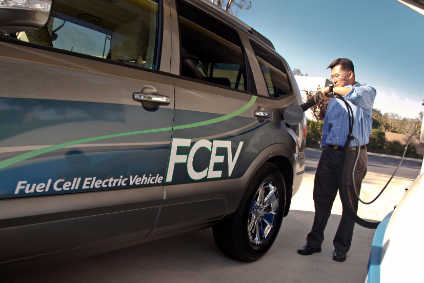The prospect of tighter air quality controls is pushing hydrogen fuel cell technology further into the spotlight and helping to drive investment in refuelling stations and other vital infrastructure. But is it too late for this mature area of tech innovation to increase its market share?
According to the updated Air Quality Plan, the UK Government is proposing to ban the sale of new petrol and diesel cars from 2040 and give GBP255m to local authorities to tackle air pollution locally. A ‘targeted’ scrappage scheme is also being considered, which would incentivise certain motorists, based on their income or pollution levels in their local area, to switch to cleaner vehicles.
Growing concern about air pollution and the proposals in place to tackle it have already led to a surge in the sale of electric and hybrid vehicles. Last year, the number of electric vehicles on roads worldwide rose to a record high of 2m, according to research by the International Energy Agency.
But could hydrogen fuel cell technology be preparing to finally make a breakthrough?
Having mapped patent filings in the category of alternative-powered vehicles, Withers & Rogers has found that innovation activity involving hydrogen fuel cells and batteries has remained flat since 2013, although there was a spurt of innovation activity in battery technology between 2006 and 2013. The graph below also shows that innovation activity involving batteries overtook that of hydrogen fuel cells in 2009. Based on an analysis of ‘patent families’ – which provide the best indication of the volume of innovation activity taking place – around 250 hydrogen fuel cell-powered vehicle patent applications were filed in Europe in 2015 compared to around 800 battery-powered vehicle applications. This indicates that progress to a hydrogen-powered future is currently in the back seat.
For hydrogen fuel cell technology, the main barriers to take up have been the cost of refuelling stations and other infrastructure requirements. The investment needed to fund the required infrastructure needed to store and pipe the fuel will need to come from vehicle manufacturers and/or those involved in the generation or distribution of hydrogen. Innovators such as ITM Power, for example, have been focused on the development of micro-generation systems, capable of generating hydrogen locally, or taking it from the National Grid, in order to create base stations around the country. The company has recently reported a strong order book linked to growth in the international hydrogen bus market.
At the same time, Toyota, which owns more than 8,000 patents related to hydrogen fuel cell control systems, infrastructure and packaging, is offering licences free from royalty payments to rival innovators and vehicle manufacturers in a bid to secure standard status for their technologies.
This industry push to accelerate the way to the hydrogen future appears to be driven by the fact that hydrogen-powered vehicles offer some clear advantages over their battery-powered counterparts. For example, hydrogen has a much higher energy density, which gives vehicles a longer range. This means hydrogen is particularly well suited for fuelling heavier vehicles used by the transport and road haulage industries.
Despite these advantages, it is unlikely that hydrogen-powered cars will go into mass production anytime soon. Whilst demand for non-hybrid, battery-powered cars is still limited, innovation focused on increasing energy density and eliminating the need for plug-in points, is expected to bring new, more user-friendly solutions to market in the not too distant future.
Greater regulatory pressure to find an alternative to the internal combustion engine will continue to spur on innovation in both fields of R&D. In the future, hydrogen fuel cell technology may well find mainstream application for public transport and road haulage vehicles, but battery-powered cars are likely to remain the clean car of choice for motorists.

Russell Edson is a partner and patent attorney at intellectual property firm, Withers & Rogers. He specialises in the automotive and transport sector.







